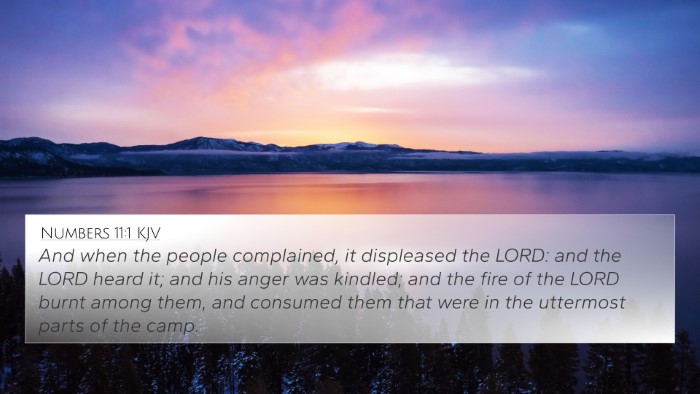Meaning of Deuteronomy 9:22
Deuteronomy 9:22 states: "And at Taberah, and at Massah, and at Kibroth-hattaavah, ye provoked the LORD to wrath." This verse serves as a poignant reminder of the Israelites' repeated acts of rebellion against God during their wilderness journey. To understand its significance, we can incorporate insights from various public domain commentaries such as those by Matthew Henry, Albert Barnes, and Adam Clarke.
Contextual Analysis
This scripture occurs in a larger passage in which Moses recounts the history of the Israelites, underscoring their disobedience and God's enduring mercy. It references three specific locations—Taberah, Massah, and Kibroth-hattaavah—where the Israelites provoked God through their grievances and lack of faith.
Insights from Public Domain Commentaries
-
Matthew Henry:
Henry emphasizes the repetition of Israel's rebellion as a testament to the ingrained struggle between human discontent and divine patience. He highlights that these locations symbolize particular instances of sin, where the Israelites, rather than relying on God's provision, exhibited doubt and complaint.
-
Albert Barnes:
Barnes interprets this verse as an indictment of the people’s faithlessness. He points out how these events collectively illustrate a pattern of forgetfulness about God’s past deliverances. Each site marks moments when the Israelites challenged God's authority and subsequently faced His wrath, outlining the severe consequences of their unbelief.
-
Adam Clarke:
Clarke provides a detailed geographical and historical context to the mentioned locations. He notes that 'Massah' represents the testing of God, alluding to their thirst at Rephidim when they questioned God about His presence (Exodus 17:1-7). Clarke emphasizes the theological implications of testing God and how it reflects a lack of trust.
Thematic Connections
The themes of rebellion, divine justice, and grace permeate Deuteronomy 9:22, making it integral to a broader understanding of the relationship between God and Israel. The Israelites’ history of provocation serves as a teachable moment about accountability and the importance of faithfulness.
Cross-References
To further explore the connections between Bible verses, consider the following related scriptures:
- Exodus 17:7: "And he called the name of the place Massah, and Meribah, because of the chiding of the children of Israel…" - Further detailing the testing of God at Massah.
- Numbers 11:1: "And when the people complained, it displeased the Lord…" - Illustrating the discontent and complaints of the Israelites.
- Psalm 78:19: "Yea, they spake against God; they said, Can God furnish a table in the wilderness?" - A reflection on the Israelites' doubts during their journey.
- Numbers 14:22: "Because all those men which have seen my glory, and my miracles, which I did in Egypt and in the wilderness, and have tempted me now these ten times…" - Acknowledgment of the Israelites’ repeated testing of God.
- Hebrews 3:8: "Harden not your hearts, as in the provocation, in the day of temptation in the wilderness…" - A New Testament admonition referencing the Israelites' rebellion.
- Deuteronomy 6:16: "Ye shall not tempt the Lord your God, as ye tempted him in Massah." - A direct reminder to avoid repeating their past mistakes.
- 1 Corinthians 10:10: "Neither murmur ye, as some of them also murmured, and were destroyed of the destroyer." - A cautionary note reflecting the events in Deuteronomy.
The Importance of Cross-Referencing
Understanding Deuteronomy 9:22 in the context of these cross-references provides a comprehensive view of the biblical narrative concerning Israel's failures. Such cross-referencing is critical for deepening Bible study. Here are some effective tools for cross-referencing:
- Bible Concordance: A comprehensive index of biblical words, allowing for easy locating of relevant verses.
- Bible Cross-Reference Guide: Resources that provide insights into connected scripture themes.
- Cross-Reference Bible Study Methods: Approaches that encourage exploring connections between scriptures.
Conclusion
The account in Deuteronomy 9:22, alongside cross-referenced passages, emphasizes the significance of faith, obedience, and the recurring need for spiritual reflection. Through understanding these events and their theological implications, one can draw lessons pertinent to contemporary faith journeys.





